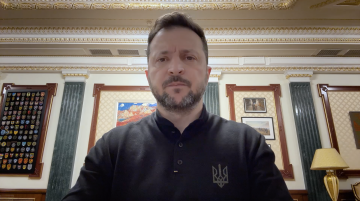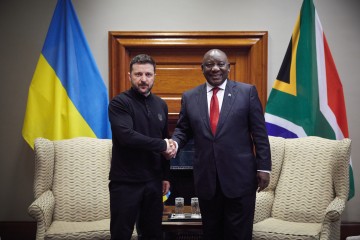We, the Heads of State/Government of Georgia, Republic of Moldova and Ukraine met in Brussels today on the margins of the 6th Eastern Partnership Summit and issued the following statement.
We welcomed the Joint Declaration of the Eastern Partnership Summit ‘Recovery, Resilience and Reform’ issued today in Brussels, and by endorsing long-term policy objectives and the next generation of post-2020 priorities reaffirm our strong commitment to strategic, ambitious and forward looking Eastern Partnership based on common fundamental values, mutual interests and shared ownership and responsibility. We welcomed the endorsement by the EaP Summit the Economic and Investment Plan for the Eastern Partnership, which includes concrete flagship initiatives for Partner Countries.
We reemphasized that the Association Trio initiative promoting European choice, European aspirations and European identity of their peoples, designed to enhance cooperation on European integration, remains committed to further strategic development of the Eastern Partnership in line with the principles of differentiation and inclusivity.
We reaffirmed our strong commitment to further strengthening the political association and economic integration of Georgia, Republic of Moldova and Ukraine with the European Union, including through continued close cooperation to strengthen the rule of law and advance reforms to meet the Copenhagen criteria.
We recalled that according to Article 49 of the Treaty on European Union any European state which respects the values referred to in Article 2 of the Treaty on European Union and is committed to promoting them may apply to become a member of the European Union.
We noted that respect for the common values and implementation of the Association Agreements/DCFTAs will contribute to the future progressive developments in our relationships. We recalled that the effective implementation of the AAs and their DCFTAs, including the broader process of legislative approximation, will contribute to further economic integration with the European Union Internal Market as envisaged in the Association Agreements.
We acknowledged the need to enhance cooperation of the Association Trio with the EU aiming at increased coordination among them on matters of common interest related to advancing the European Integration, including recognition of the European perspective of the Association Trio by the EU.
We emphasized that building on the positive experience of informal DCFTA ministerial meetings, the Association Trio is looking forward to extending enhanced sectoral cooperation with the EU to other areas in particular green and digital transitions, connectivity, energy security, justice and home affairs, strategic communication and healthcare.
We expressed our interest in deepening cooperation of the Trio countries with the EU with the aim of integration into the EU Digital Single Market, including by means of participation in Digital Europe, Connecting Europe Facility as well as reducing roaming charges between the EU and the Association Trio.
We are ready to make all efforts to enhance cooperation with the EU including at the high level in order to strengthen European energy security to make full use of existing gas transmission routes, full application of the EU legislation, synchronization of electricity networks and preventing usage of energy as a weapon.
We noted the need of enhancing connectivity and transport links between the EU and the Association Trio including through road transport market liberalization, developing transport corridors as well as realization of joint infrastructure projects with support of Eastern Partnership Economic and Investment Plan.
We acknowledged that dramatic changes of the situation in the Eastern Partnership and Black Sea region since the 5th Eastern Partnership Summit in 2017, including security, energy, health and other emerging challenges should be collectively addressed by the Partner countries in close cooperation with the EU. We emphasize that continuous destabilisation and violations of the principles of international law in many parts of the EaP region pose a serious threat to peace, security and stability in Europe. We welcomed EU’s active efforts in conflict resolution and confidence building processes and called for its strengthened role in facilitation of peace and stability in the EaP region using all available instruments including relevant restrictive measures when necessary. We called on the EU leaders to address these issues at the meeting of the European Council on 16 December 2021.
We recalled that Russia’s annexation attempts and illegal occupation of the territories of Georgia, its aggression in the east of Ukraine and temporary occupation of Crimea as well as the unresolved conflict in the Transnistrian region of the Republic of Moldova pose a serious threat to the region and Europe as a whole.
We reiterated our strong condemnation of the clear violation of sovereignty and territorial integrity of a number of EaP states, including incitement and support of conflicts, using disinformation and cyberattacks, increasing militarisation of the region, violations of human rights, or holding elections on temporarily occupied territories.
We also noted the importance of further enhancing resilience and cooperation in the area of Common Security and Defence Policy (CSDP) and Common Foreign and Security Policy (CFSP) with the EU and recalled our joint commitment to promote the principles enshrined in the Association Agreements. We looked forward to developing cooperation with EU agencies and mechanisms, including the European Peace Facility and participation in PESCO projects. We also expressed our interest to engage in a dialogue with the EU on the basis of the Security Compass initiative.
We reiterated our determination backed by the strong will of our peoples to work towards joining the European Union. In this respect, we call on the European Union to support the sovereign choice of our states together with all the relevant steps taken by us vis-a-vis European integration and acknowledge the European perspective of Georgia, Republic of Moldova and Ukraine.



